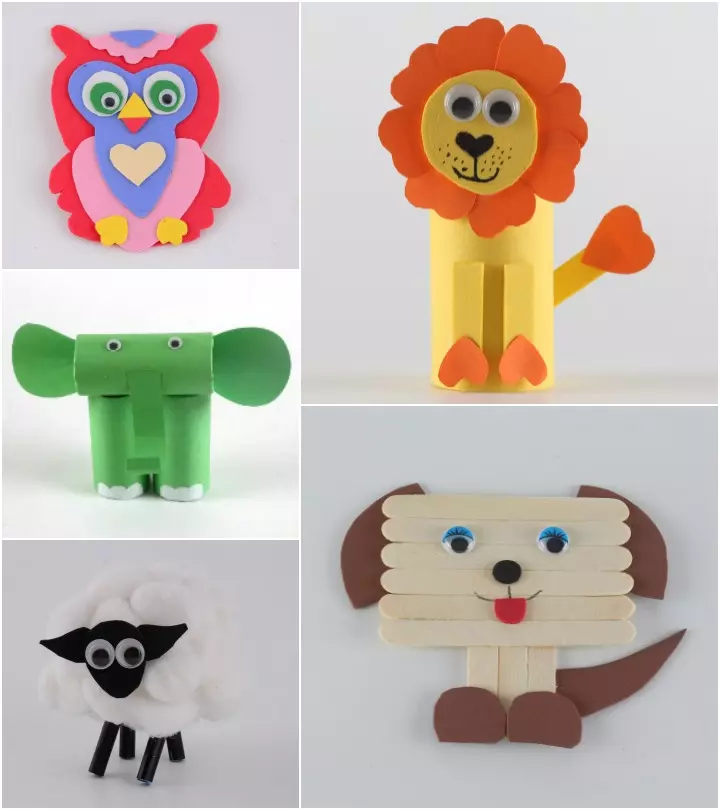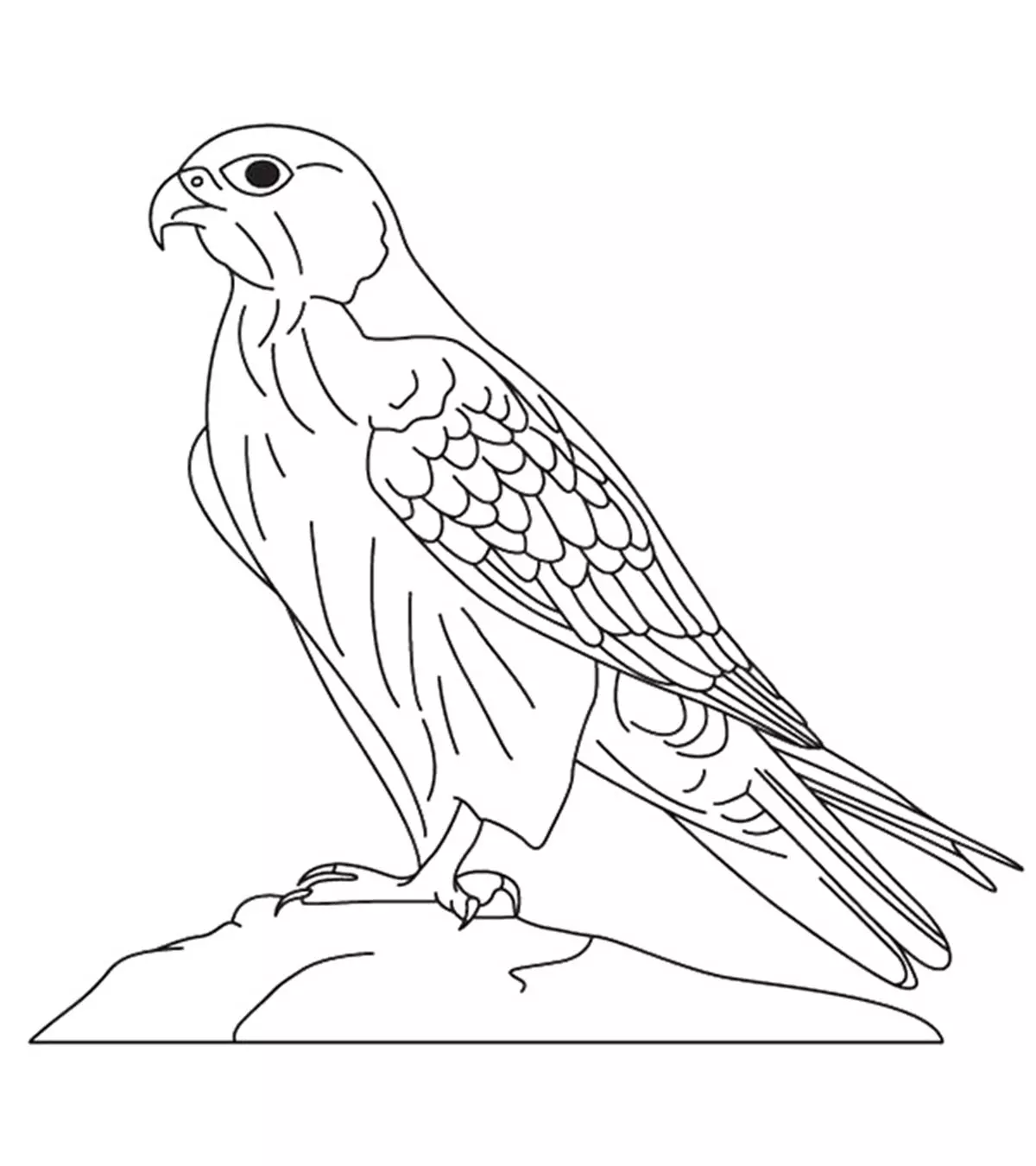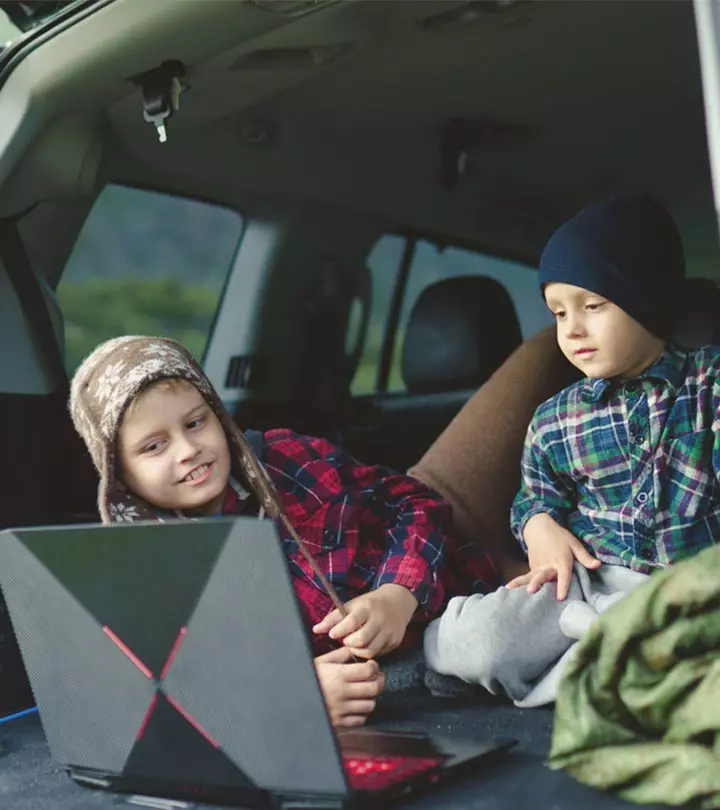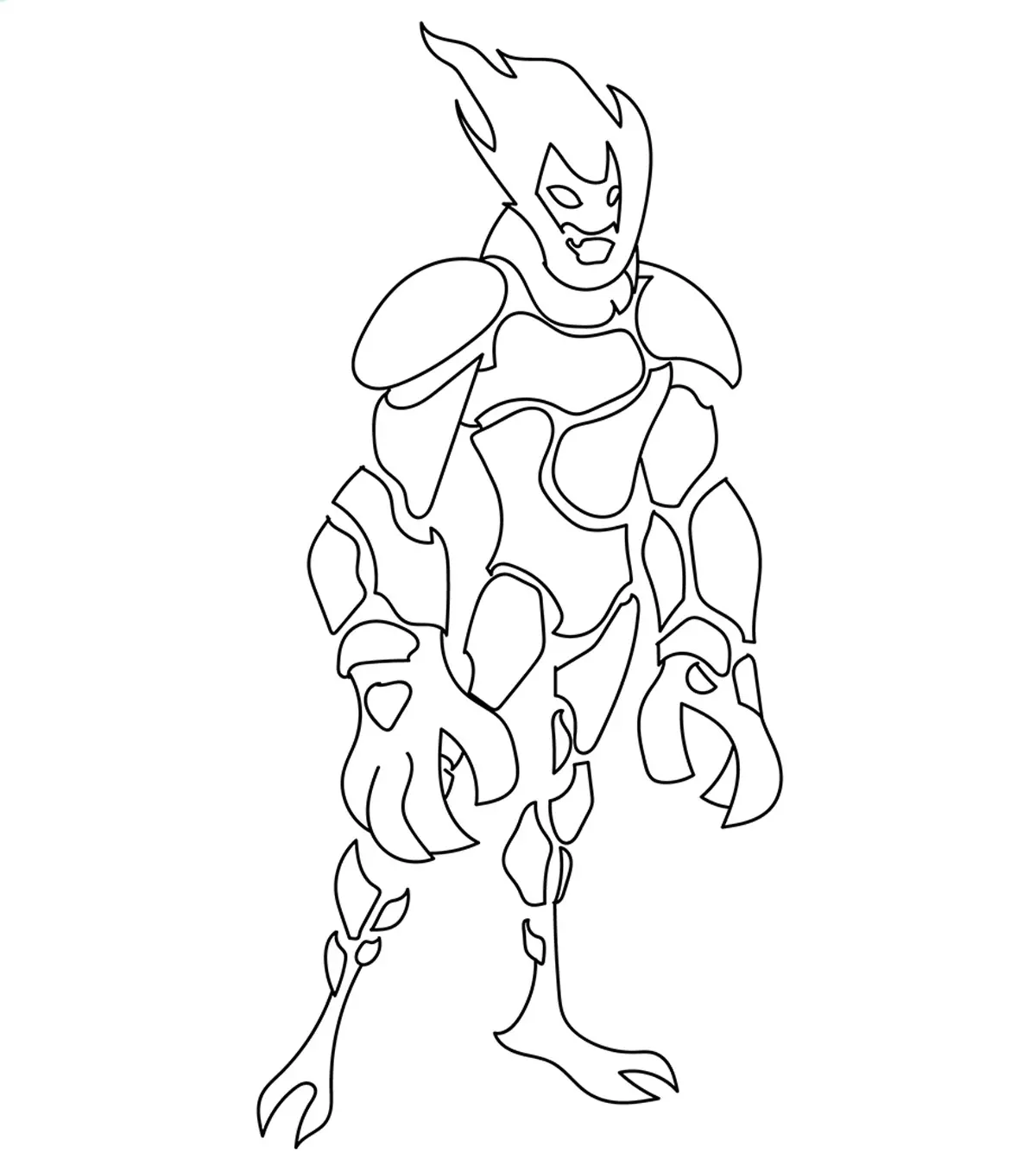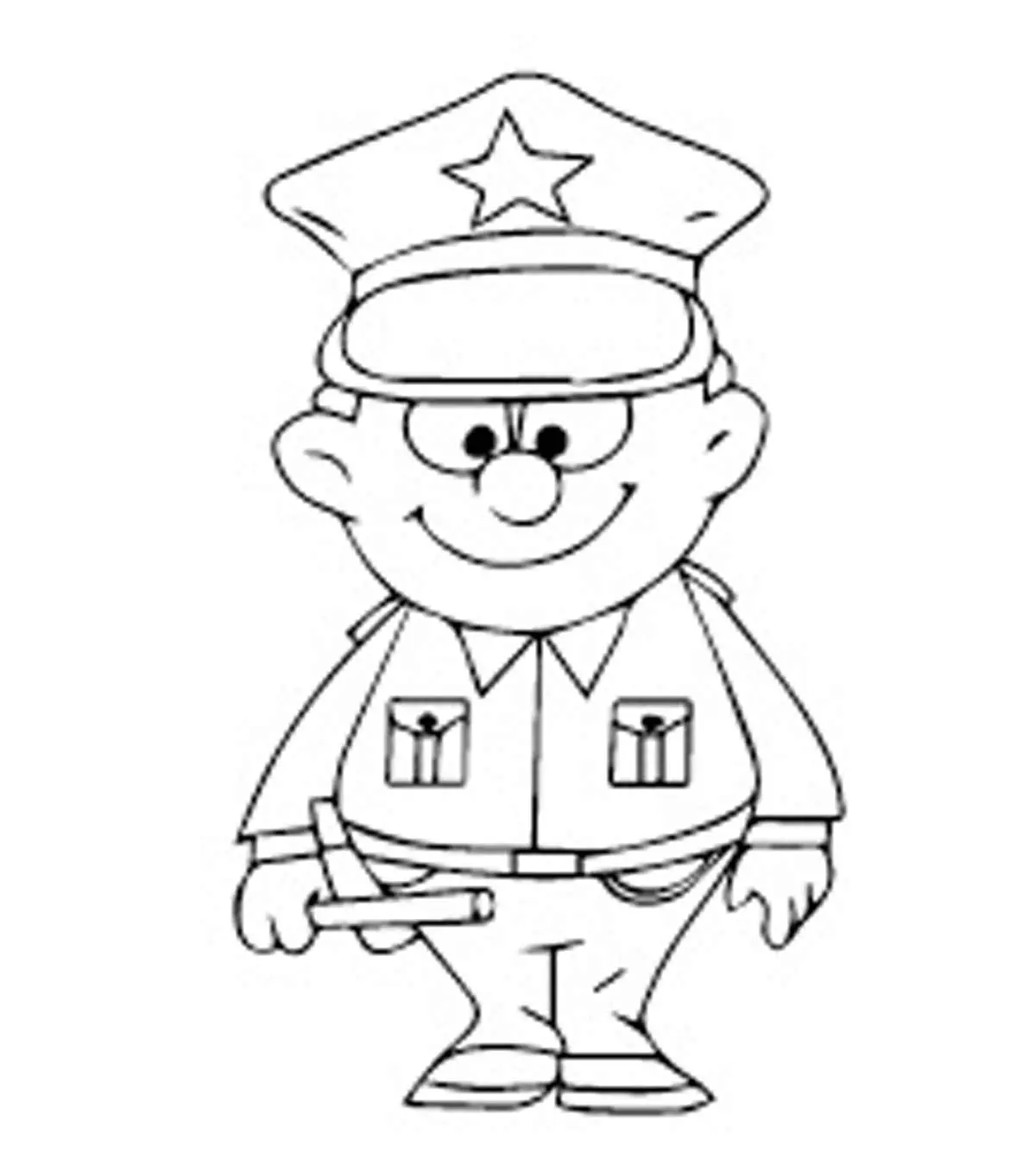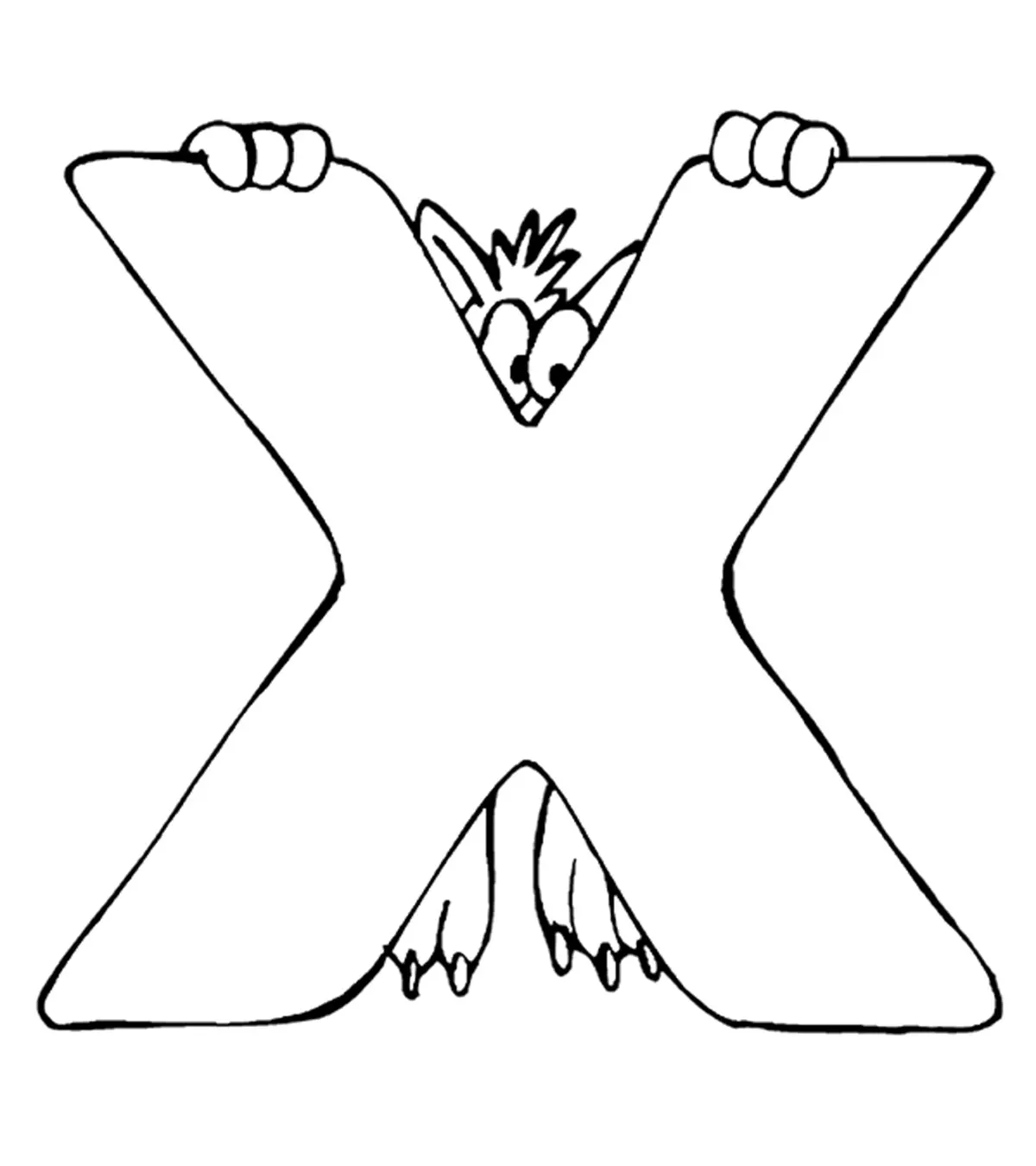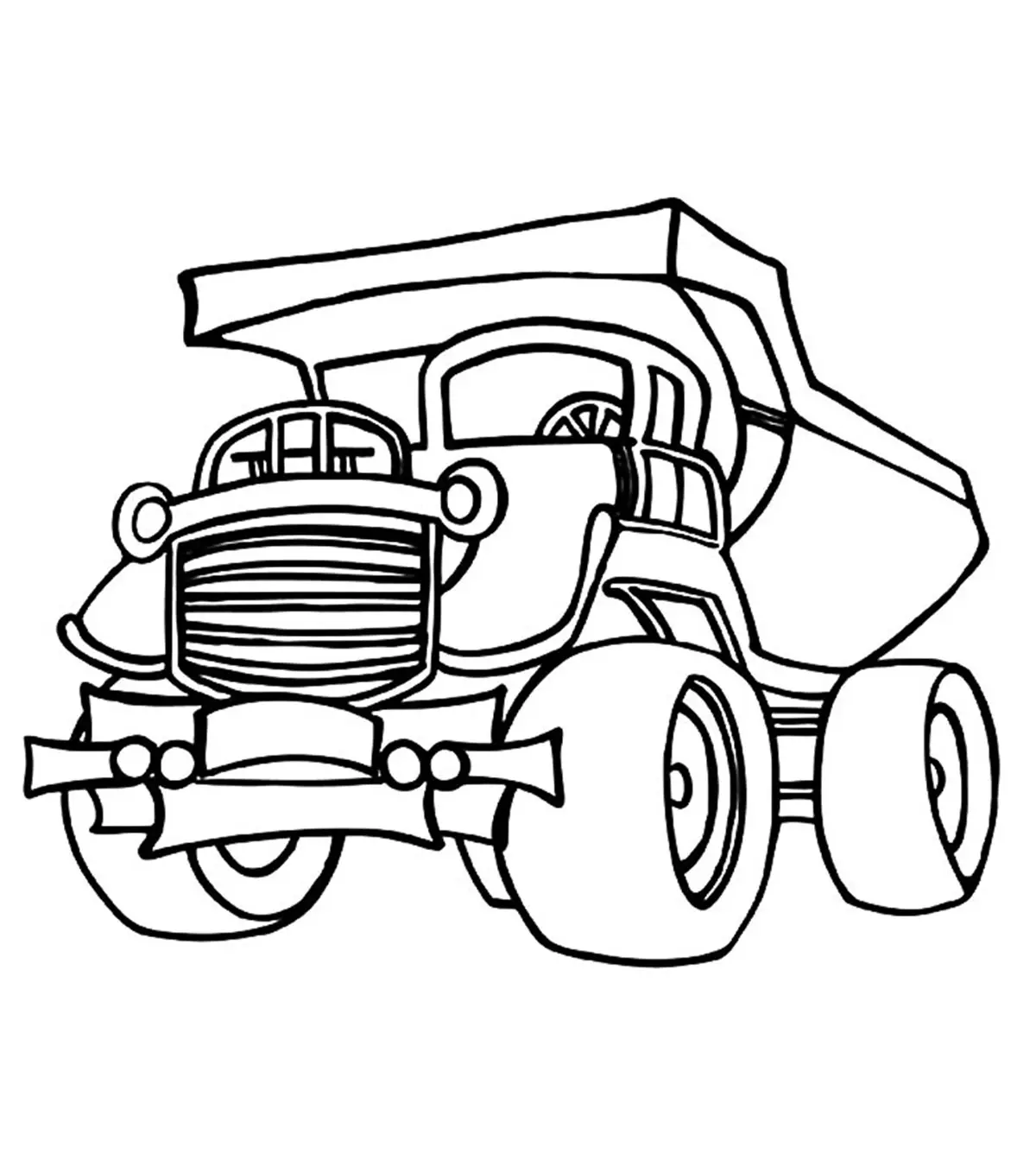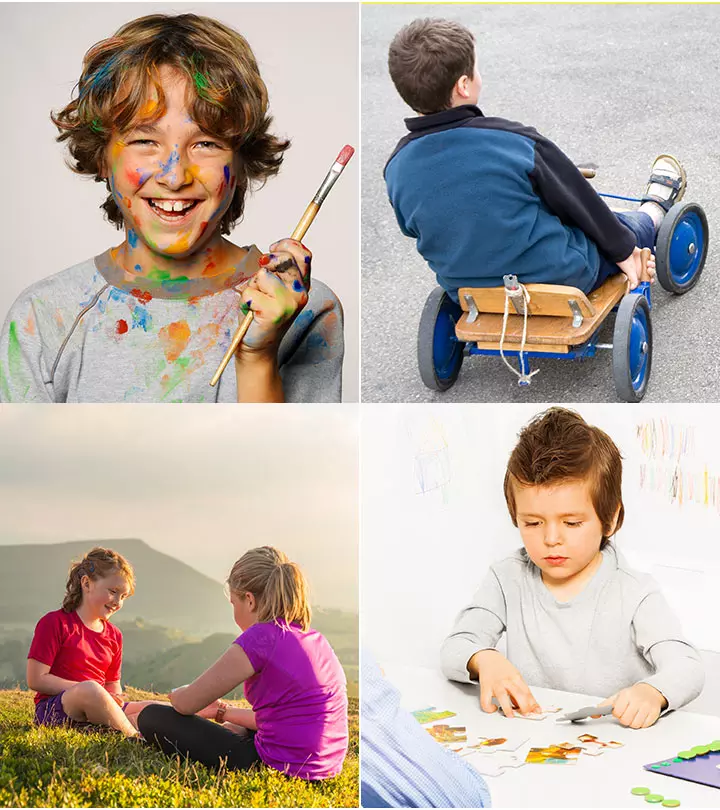
Image: MomJunction Design Team
Teenagers with autism have unique requirements. Thus, activities for teenagers with autism should be designed to cater to their needs and help them grow. Unlike others, they have difficulty learning and comprehending what they see, hear, or feel. So, how realistic is it to expect them to learn via traditional classroom methods? They learn better when they participate in activities that teach them specific skills, daily habits, and behaviors. Providing them with an environment that nurtures and values them as individuals can aid their development. Here are some enjoyable and engaging activities for teenagers with autism to help them grow and develop. The exercises can help them enhance their sensory, social, and cognitive skills.

Key Pointers
- Social activities can benefit teenagers with autism by improving communication, socialization, and reducing social anxiety.
- Reading books, listening to music, solving puzzles, and playing computer games can develop language, communication, cognitive, and problem-solving skills, respectively.
- Activities like dancing, camping, gardening, chores, and tennis can promote interaction and develop social skills in teenagers with autism.
- Some sensory activities that can help improve the skills of teenagers with autism are staring contests, emotion charades, matching games, and spotting the difference.
- Games that involve taking turns, such as board games, can teach order to teenagers with autism, while crafts with clay and painting with ice can boost creativity.
What Is Autism?
Autism is a developmental disability that exhibits a range of symptoms, characteristics, and severity levels (1).
Though the symptoms of autism vary from teen to teen, most troubled teens tend to have social and communication problems and inappropriate sensory development. So, you need to boost your teen’s morale and encourage them to participate in several social and creative activities.
Importance Of Activities For Teens With Autism
Teenagers with autistic disorders often have difficulties communicating and socializing, and lack of necessary skills adds to their social anxiety. To help them develop the necessary social skills and find their identity, teachers and caregivers should indulge them in social activities.
Social activities allow teenagers with autism to (2).
- Explore and develop their interests.
- Be confident and try new things.
- Learn accepted social behavior.
- Meet like-minded teens and spend some quality and learning time with them.
- Learn new skills like dancing, singing, sports, etc.
You could help your teens join a club or a community center keeping in mind their interests. You can also assist them to start a club of their own and invite people with similar interests to join.
Engaging Activities For Teenagers With Autism
A classroom lecture is not an effective teaching methodology for students with autism. Teenagers and young children with autism tend to learn something better when you let them experience it practically.
Here are some engaging activities to do with a teenager with autism. They are aimed at teaching and developing skills required for a comfortable and confident social life.
Individual Activities
Children with autism do not pick up social skills as quickly or easily as other children. But you can start building your child’s skills slowly. Here are a few solo activities to do with teenagers with autism.
1. Reading simple, interesting books

Reading helps enhance cognitive functions and keeps the brain active. Sit with your teen and encourage her to read educational, fiction, and scientific books that are easy to read and understand (3).
How it helps: Develops language improves learning and comprehension skills.
You will need: A collection of interesting educational, scientific, and fiction books and novels.
Type: Indoor activity
What to do:
- Schedule reading hours for your teen.
- Encourage her to read easy-to-read yet interesting books.
2. Listening to music and music therapy
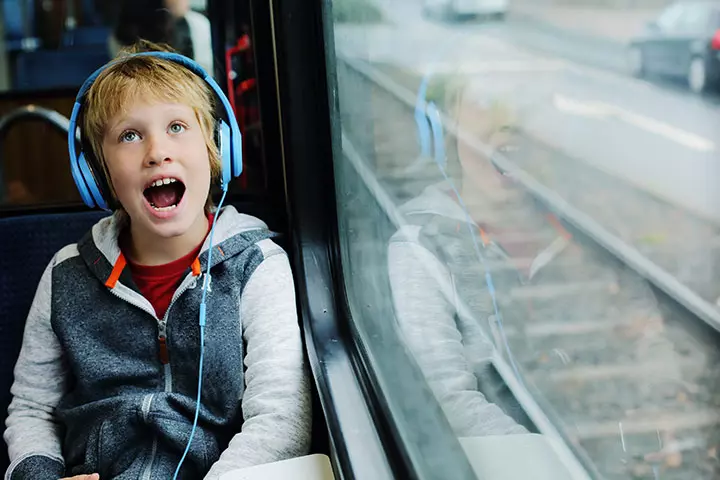
Music can be therapeutic. Music therapy helps your adolescent with autism develop language and speech abilities. Music contributes to improving the teen’s life, inculcates positive changes in their behavior, and can serve as a relaxation technique. Therapeutic activities for teens related to music can also help them learn to communicate effectively (3).
How it helps: Relaxes the teenager, and reduces anxiety; it can also support memory enhancement and communication.
You will need: A collection of entertaining and enjoyable songs and themes.
Type: Indoor activity
What to do:
- Make your teen listen to several interesting songs every day.
- Encourage her to join music classes and sing simple songs.
- Encourage her to participate in musical programs at school or college and sing in a choir.
- Try introducing her to musical instruments. She may like playing an instrument more than singing.
3. Puzzles

A puzzle is about bringing different parts together to something meaningful. Teenagers with autism are visually skilled and enjoy working on puzzles (4). They have hyper-focus, which they can use to solve puzzles. They can sit for hours together trying to solve one. Puzzles are also used to help children with speech disabilities.
How it helps: Puzzles enhance cognitive abilities, speech and communication skills. They could also spark their imagination.
You will need: Jigsaw puzzles of different levels – simple to complex.
Type: Indoor activity
Instructions:
- Puzzles are excellent tools for engaging teenagers with autism. So, use them at a time in the day when they tend to get restless.
- Start with a simple puzzle at first and slowly increase the difficulty level of the puzzles you choose for your teen.
- Your teen may become engrossed in the activity, but try to make them talk about what they are doing and thinking. It helps strengthen their communication skills. Let them talk at their own pace, don’t rush them.
Nicole Leger, a blogger and a teacher in the autism transitional classroom (ATC), shares teaching functional play skills to students with autism. She says, “When I start to teach a young student how to play with toys, I begin with toys such as stacking rings, texting cups, shape sorters, and inset puzzles with a clear beginning and end. Some of these toys appeal to students with autism because they can line the items up vertically. I like these toys because they are the building blocks of skills like matching, size concepts, and ordering. I also like using them because they are easy for the student to learn how to complete (i).”
 Point to consider
Point to consider4. Computer games

Unlike what many people think, computer games are not all bad. The right technology-based activities or games can teach your children a lot of things and help develop their skills. Research reveals that teenagers with autism can develop their social skills and problem-solving skills by playing computer games (5).
Pick a computer game matching your teen’s IQ and skill levels. Set aside half an hour every day in their schedule to play these games. Most teens with autism like a routine. It gives them something to look forward to, and having a predictable schedule or routine minimizes stress, anxiety, and agitation.
How it helps: Improves social skills, encourages them to use logic, story-based games encourage imagination and creativity
You will need: Time management games, role-play games, storytelling games, puzzles
Type: Indoor activity
Instructions:
- Start with a simple training game like Eric Goes to the Airport or Robbie the Robot coaches that teach them about basic behavioral skills when in public.
- If your child enjoys it, you can try introducing a role play or a time management game.
- MMO games are an excellent idea for working on your teen’s social skills.
- Your teen can also learn about socialization when they play multi-player games with family and friends.
5. Draw Something app
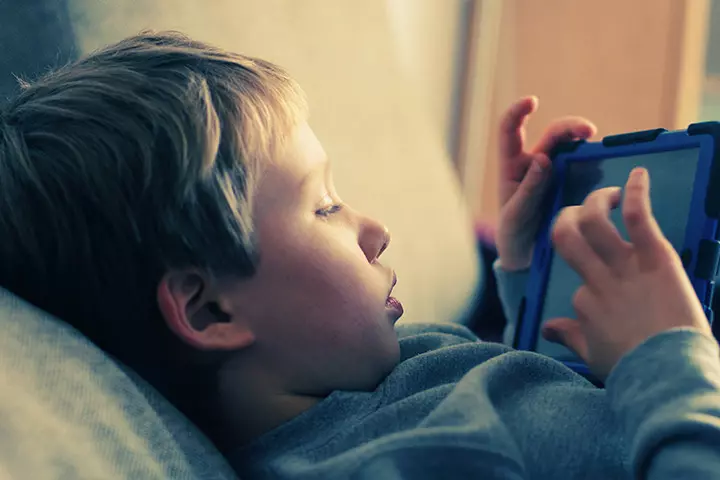
If your teenager likes technology, you can try getting him or her to use the app called Draw Something. It is a social drawing tool that allows you to play with your friends and send messages in the form of pictures they draw.
How it helps: The game is about creative communication and teaches the teen a creative way to express himself and try to understand what the other person is trying to say.
You will need: A smartphone with the Draw Something app
Type: Indoor game
Instructions:
- Introduce the game to your teen. Use two phones to play the game with him first.
- Give your teen one phone, and you take the other. Play the game with each other first and see how he responds.
- In all probability, your teen would like it. Once he is comfortable with it, you can teach him how to play the game with other online players.
Team Activities For Adolescents With Autism
Interaction is the key to developing social skills. To help your teen with autism with their social life, encourage them to participate in team activities and events as much as possible. That said, you should not push them into something they are not comfortable with. Ease them into society one step at a time.
6. Dancing

Dance therapy is a type of art therapy that utilizes dance and movement to promote the overall health and wellness of individuals with autism (6). Dancing is fun and will help make your child feel happy and fresh. Dance is also a social activity that they may have to learn about to have successful romantic relationships in the future.
According to the American Dance Therapy Association, dancing involves mirroring, which has several benefits for children with autism. It states, “As more awareness of self develops, those with autism learn to become aware of other people. Recognizing and re-sponding to another, increasing eye contact, participating in shared experi- ences and engaging in shared focus, breaking through isolation, decreasing the interpersonal distance that is part of the social isolation, and developing trust are all treatment goals in dance/movement therapy with individuals with autism (6).”
How it helps: Improves social interaction skills and boosts their confidence
You will need: Music and place to dance
Type: Indoor or outdoor activity
Instructions:
- Show them a few dance videos online to introduce the concept.
- One of the best ways to teach your kids something is to model that behavior. Show them how to dance, or better, dance with them.
- Display positive behavior and emotions when you dance, to encourage the teen to try it. Don’t pull them onto the dance floor. Let them come and join you.
- Take them to events where people dance and have fun.
- You could even call a few of your teen’s friends for a dance party. If his friends dance, your teen is likely to dance as well.
7. Go for camping

Camping is a great idea if your teenager already has a few social skills and gets along fairly well with different people in the group. Camping with friends and strangers can help in developing social skills and learning new life skills. Life skills training instructs individuals on a variety of everyday tasks, which encompass personal hygiene as well as outdoor safety and other essential abilities (7).
How it helps: Develops social skills and basic life skills
You will need: Camping materials, bags, tents
Type: Outdoor activity
Instructions:
- Take your teen on a camping trip with the family. Let him experience it among people he is comfortable with first.
- Then plan a camping trip with a few friends that your teenager knows and some he doesn’t know. The idea is to help him get along with people he meets for the first time.
- Once he gets the hang of what camping is about, you can encourage him to go on camping tours on his own, with his friends or group members.
8. Play tennis
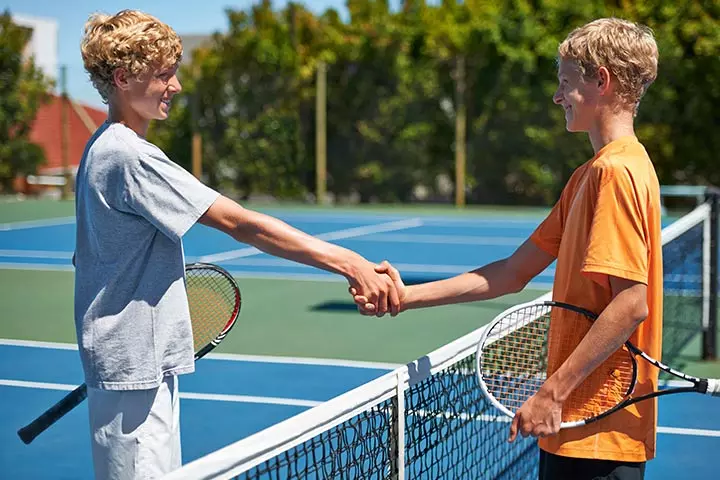
Tennis is an excellent game for the body and mind. The game allows your teenager to become physically stronger while teaching him or her to compete sportively with other players.
How it helps: Importance of rules, healthy competition, physical exercise
You will need: Tennis racquets and balls, tennis court
Type: Outdoor game
Instructions:
- Introduce the game to your teen by showing them videos or a few games on TV.
- Take your teenager to the tennis court, give her tennis racquet and ball, and educate her to play tennis.
- Initially, teach her simple and slow ways to play the sport and gradually raise the difficulty level.
- Enrolling them in a tennis club can help them practice the game with other players.
9. Household chores

Teenagers with autism have difficulty understanding concepts like responsibility and sharing. You can help your child understand the ideas practically. The best way is to get them to help you with chores around the house.
How it helps: Home maintenance, they become more responsible about what they are supposed to do, helping family, community service.
You will need: NA
Type: Indoor activity
Instructions:
- Start by giving them small tasks like passing something from the fridge, putting things in place, using a cloth to clean or dust a surface, etc.
- As they get comfortable doing things around, you could teach them to make their beds, set the table, clean around the house, and even help cook a small meal (8).
10. Participate in community gardening activities

Nature has a way to heal people. Community gardening can be therapeutic and also allows your teen with autism to socialize. Becoming a part of gardening projects will help boost your teen’s social skills and help her come in contact with nature in a better way than usual. Also, social skills training can help teenagers with autism in socializing.
How it helps: Helps develop social skills and sensory abilities.
You will need: A set of gardening tools containing grass shears, trowel, shovel, hand fork, and other gardening equipment.
Type: Outdoor activity
Instructions:
- If you have a home garden, try spending some time with your kid there. You could plant seeds, water plants, or rake the fallen leaves.
- Provide a gardening tool kit to your teen with autism and encourage them to participate in several gardening projects actively.
11. Role play
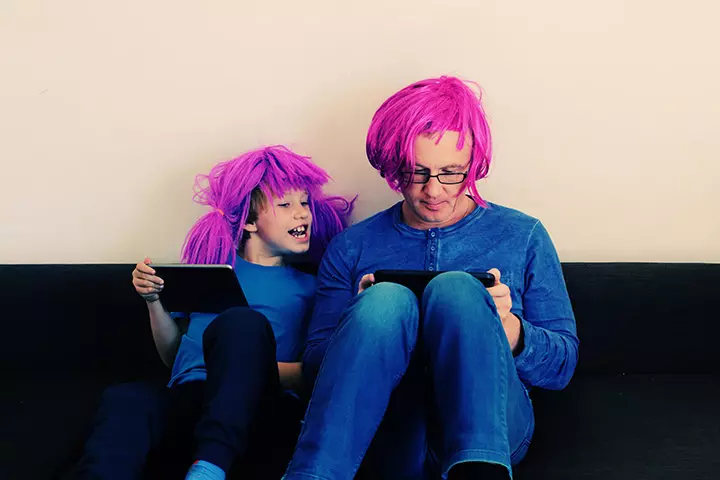
Drama therapy is a therapeutic method that creates a space for children with autism to articulate their emotions and address challenges (9). Role play is an excellent tool to help your teenager practice social skills. You can teach her how to behave in different social situations with role playing games and activities.
How it helps: Builds social skills, introduces them to social norms
You will need: A list of situations, events that your teen is likely to encounter and a script to teach him or her how to behave in that situation
Type: Indoor activity
Instructions:
- Start with a basic role play like an interaction with a salesman at the supermarket.
- Move on to other social situations involving more people. Try being a different person each time, so that they understand that not everyone is the same.
- Role plays can also be used to teach them how to interact with their classmates, friends, and teachers at school.
Activities To Improve Sensory Skills
The sensory skills of a teenager with autism are not as developed as they should be for their age. Teens with autism cannot function at the same level as a typical teenager. Indulging them in these activities and games can help improve their sensory abilities. Also, sensory integration therapy is a treatment that is designed for individuals who experience challenges in processing sensory information or have difficulty comprehending sensory input (10). Its primary objective is to aid children in developing the capacity to utilize all their senses in harmony.
12. Staring contest
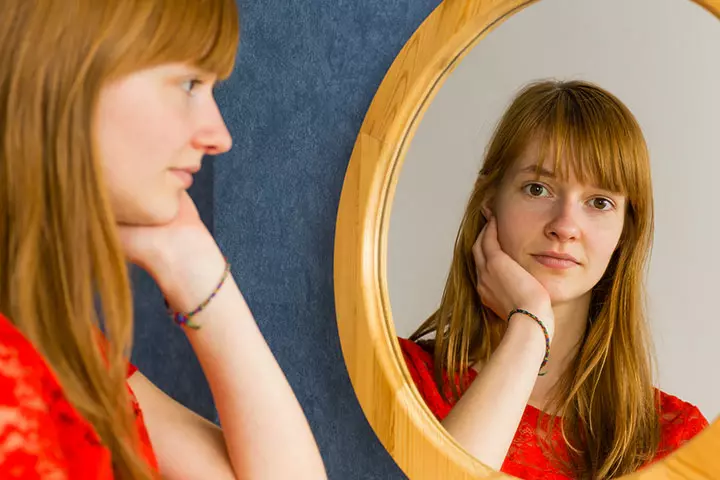
Eye contact is one the most important aspects of healthy and efficient communication. It portrays confidence and plays a major role in situations like interviews and even dates. Teens with autism are not very comfortable with looking other people in the eye. You can help them change that with this activity.
How it helps: Helps them make healthy, appropriate eye contact
You will need: Nothing
Type: Indoor activity
Instructions:
- Sit opposite your teenager and ask them to look into your eyes.
- Ask them to maintain contact as long as they can. Your teen may not be able to hold her gaze for more than a few seconds. That’s okay.
- Play the game as many times as you can, encouraging them each time they manage to hold their gaze longer.
As you progress, you can also teach them the difference between healthy eye contact and staring (11).
 Quick tip
Quick tip13. Spot the difference
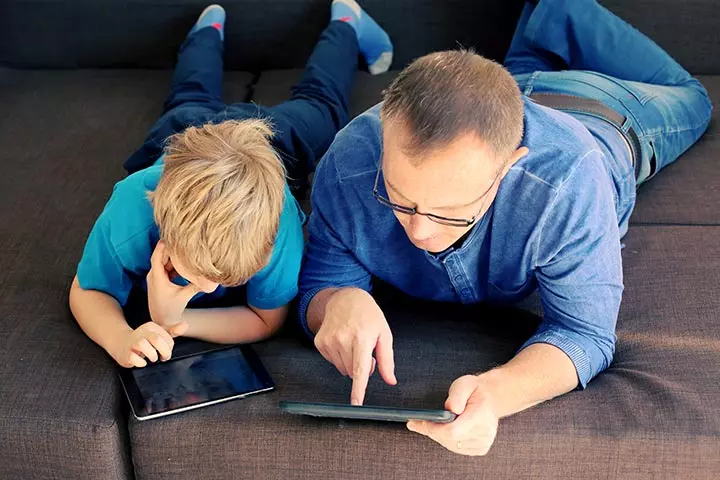
Children with autism have strong visual skills but not the intelligence to look for subtle differences (4). You can help them make the most of their visual skills with this game.
How it helps: Stimulate their sense and encourage visual discrimination
You will need: A set of spot the difference games, sheets, or newspaper cuttings
Type: Indoor activity
Instructions:
- Start with a simple spot-the-difference game you find. Show how it is done and let your teenager try the next one.
- Let them take as much time and as many trials as they need while guiding them at every step.
- Do not reveal the answer to them, as that can be discouraging.
- Praise them each time they spot a difference.
14. Emotion charades
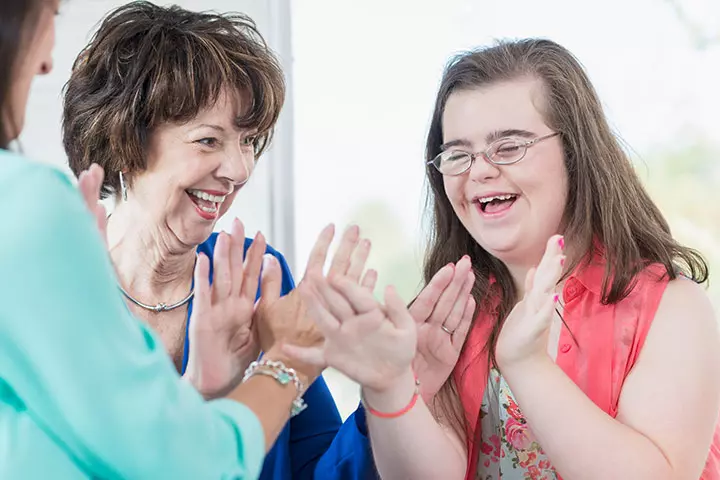
Emotion Charades is similar to the basic game, except that the teens will have to express the emotion written on the piece of paper. Teenagers with autism cannot identify emotions merely by looking at other people (12). So to teach your kid to express an emotion, show him or her videos or photos of people with different expressions and explain each.
How it helps: Improves communication, name a feeling, identify and understand expressions
You will need: Pieces of paper, timer
Type: Indoor game
Instructions:
- Play this game with family or your teenager’s friends.
- Start the game yourself and show how it is done. Encourage them to try and identify the emotion you are expressing.
- Help your teenage son or daughter pick a chit like you did and try to show what is on the paper, without speaking.
15. Matching game
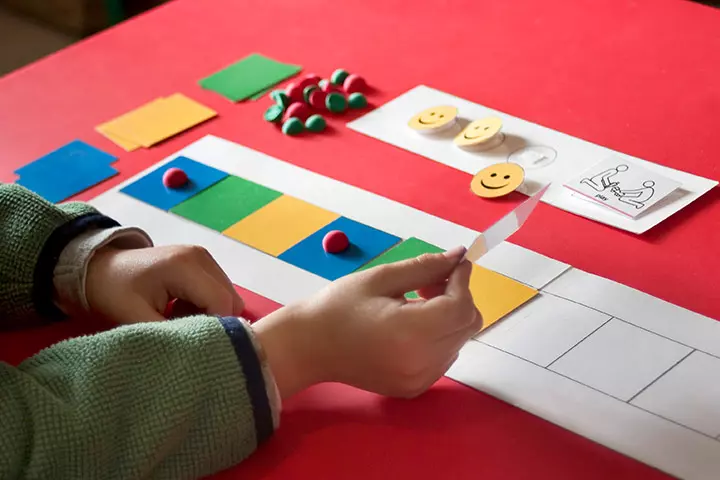
The matching game is a brain stimulant that teaches teenagers with autism to link places, objects, events, etc., with their names, features, and more. You can try this game with emotions as well.
How it helps: Enables them to connect two objects, people, words, etc.
You will need: Paper, photos of people expressing different emotions, photos of places, events, objects, etc.
Type: Indoor game
Instructions:
- Lay the photos on the table. Fold the pieces of paper into folded chits and put them in a basket.
- Ask your son or daughter to pick up one piece of paper and find the matching photo.
- Every time they get one right, praise them.
You can also play this as a group game, where your teen can be paired with a friend or family member.
16. Watching TV programs
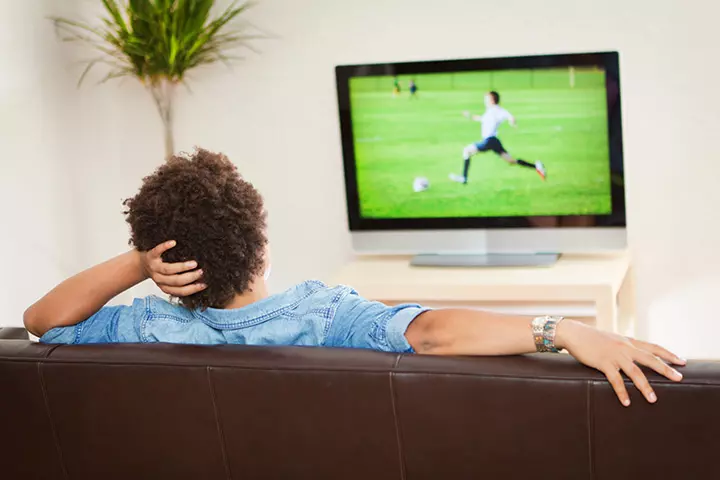
Research proves that children with autism can benefit significantly from well-chosen TV programs. Firstly, TV can open the world to your child. They learn language skills which help them get acquainted with topics that they can discuss with their peers. TV programs can also help them learn how to behave in different social situations (3).
Polly, who is 17, shares how she loves watching her favorite TV show whenever she wants to relax. She says, “Autistic people often have strong interests that they can find calming. For example, I love Dr. Who, so every day on the way home I watch an episode on the bus (ii).”
How it helps: Stimulates visual and auditory senses, develops language skills, social skills
You will need: TV, a few TV programs selected for your child
Type: Indoor activity
Instructions:
- Let them pick a video from your selection and play that.
- Watch the program together. Ask questions in between, about what is happening in the program to see if they are following.
- Don’t make it all about learning. Make sure your kid is having fun too.
17. Sensory bins
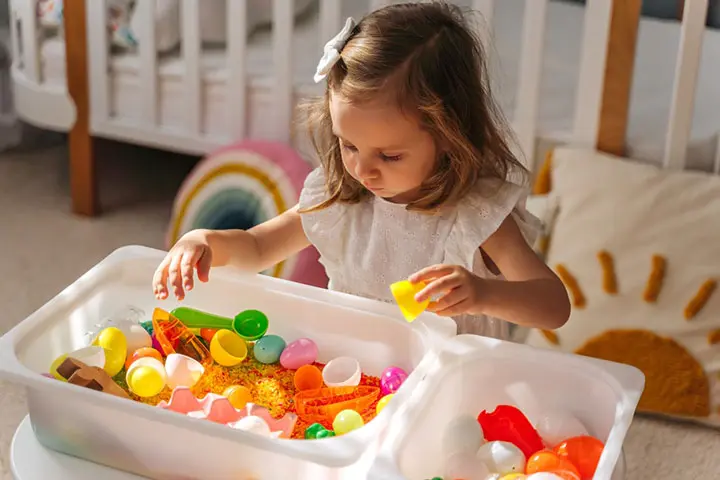
Sensory bins are a great way to let your child explore different textures, helping them learn through touch and play.
How it helps: Improves touch senses, boosts fine motor skills, and helps with sorting and recognizing objects.
You will need: A large plastic tub, fillers like rice, beans, sand, or water beads, small toys, buttons, textured balls, or stones
Type: Indoor game
Instructions:
- Pick a container like a plastic tub or box. Fill it with safe items with different textures, like rice, beans, or water beads.
- Add small toys, buttons, or stones for variety.
- Let your child explore and play with the materials, stimulating their senses and imagination.
Turn-Taking Games
The National Autistic Society states that children with autism have difficulty understanding order or organization (13). That is why when you say ‘it is not your turn’, they do not know how they are supposed to behave. The only way to teach about order is through the taking-turn games.
18. Board games
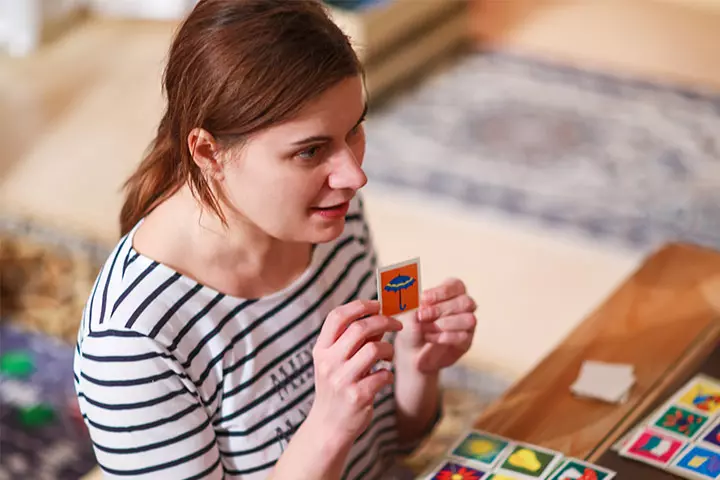
Children do not understand the idea of taking turns, as it is not an innate skill. Learning about it is all the more difficult for children with autism, who do not understand verbal explanations. Board games are some of the best games for teenagers with autism.
How it helps: Introduce the concept of rules, taking turns
You will need: Easy board games like Snakes & Ladders, Ludo, Monopoly, etc.
Type: Indoor game
Instructions:
- Start with basic games that require nothing more than throwing the dice and moving the pawn.
- Use words like ‘your turn’ and ‘my turn’ to help them understand the idea better.
- Be proactive in giving the dice back to the other players after your turn. This will encourage your teen to imitate you.
 Quick tip
Quick tip19. Playing with a car
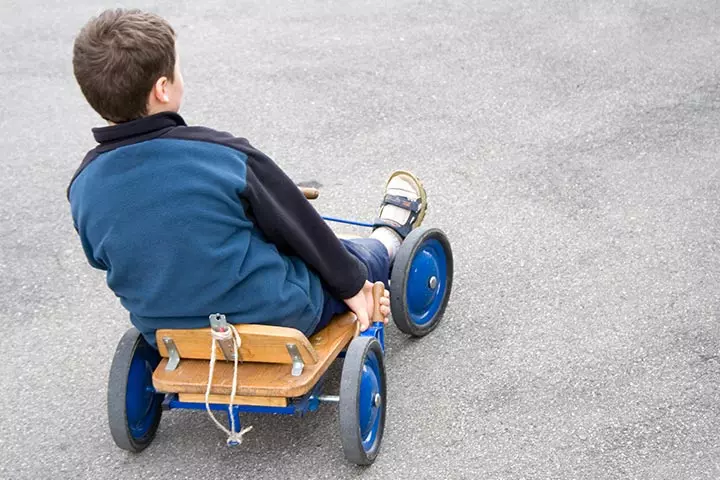
This is one of the simplest activities for teenagers with autism. If your teen has trouble understanding the concept of taking turns with board games, you can start with this.
How it helps: Teaches about taking turns, encourages patience
You will need: Pullback motor car toys
Type: Indoor game
Instructions:
- Pair up with your teen and sit opposite each other, at either end of the room.
- Play with the car, taking turns to send it to each other.
- If your teen does not want to play with a car, you could try playing catch.
Creative Activities For Teenagers With Autism
Creative activities give teenagers with autism a chance to explore colors, shapes, and materials, which helps stimulate their senses.
20. Paint with ice
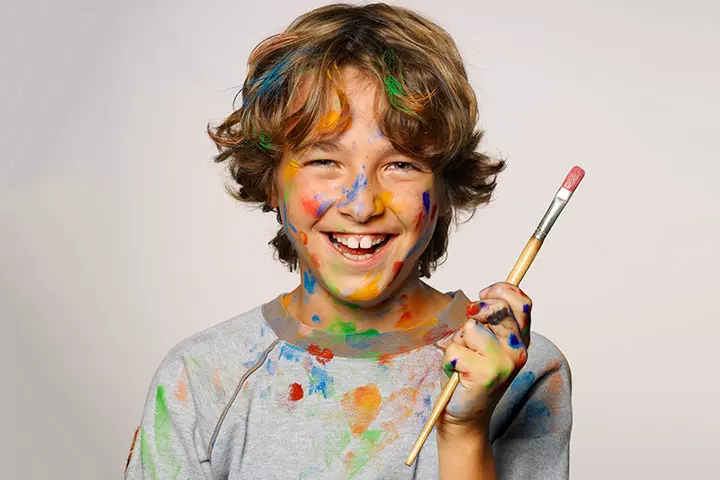
Combine ice and color, and give your child a paintbrush. When your child paints with ice, they will see color and touch something ‘cold.’
How it helps: Engages the teenager physically and mentally, encourages imagination
You will need:
- Ice tray
- Water
- Watercolor or paints
- Craft sticks
- Paper
Type:
Indoor activity
Instructions:
- Help your child mix water paints and pour them in the ice tray.
- Place the craft sticks in the center, such that they are standing; it would make it easier to hold the frozen paint cubes.
- Once the paint cubes are frozen, take them out and let your teen pick a few colors he or she wants to use.
- Give them a paper and ask them to use the paint cubes to draw or paint something on the paper.
21. Storytelling improvisation

Children with autism have difficulty thinking logically. But they have an imagination that you can help develop. One way to do that is through impromptu storytelling activities.
How it helps: Improves their imagination, encourages them to be spontaneous and creative; the right words of encouragement also boost their confidence.
You will need: A list of ideas or plots that the children can build on. Examples: My day at school, A fun day at the mall, adventure with my friend, etc.
Type: Indoor or outdoor activity
Instructions:
- Storytelling improvisation is an activity that works great with groups. Gather your teen’s friends in a circle.
- Let one person start the story with a sentence. Example, “I went to the forest today and…”
- The next person has to complete that line and add to the story. Encourage them to say what comes to their mind.
- Allowing them to build the story as they like, without evaluation, also builds their confidence.
22. Crafts with clay
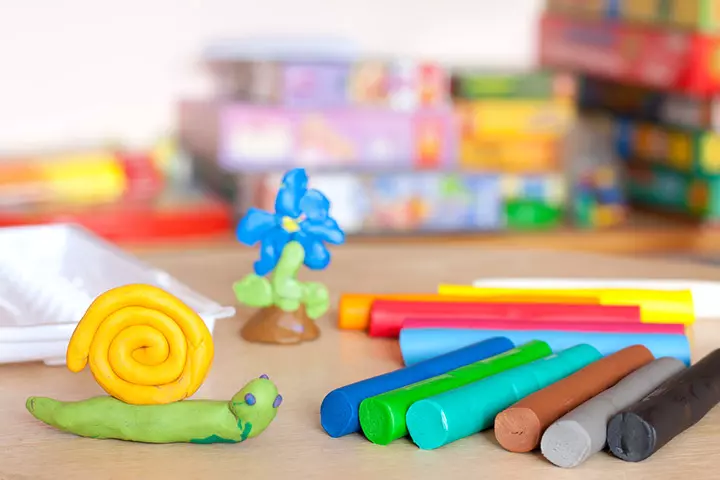
Not all teens with autism like to get their hands dirty. But if your kid is okay with it, creating crafts with clay is an activity they might enjoy. Right now, let’s learn to make a simple snowflake sculpture with clay.
How it helps: Helps develop creativity and the sense of touch; also enables them to use their hands to create something easily (14).
You will need:
- Air dry clay, white
- Clay modeling tools or snowflake molds
Type:
Indoor activity
Instructions:
- Teenagers with autism learn something better when they see it. Take your teen out to catch a few snowflakes and observe each snowflake.
- Let them understand that no two snowflakes are alike.
- Set a table with the clay, mold, and modeling tools.
- First, let them create a snowflake sculpture with the mold.
- Then encourage them to knead the dough into thin strands and make a snowflake using the tools.
Tell them to remember how the snowflake looked like. Let them create as many snowflakes as they want, in as many ways possible.
If your kid hates the look and smell of clay, you may want to avoid this activity until he or she is comfortable handling it. Otherwise, you might end up making their aversion stronger.
23. Cooking and baking
Cooking and baking provide valuable learning experiences for teenagers with autism and help them develop essential life skills (15).
How it helps: Activities like chopping and stirring improve hand-eye coordination and dexterity. Handling various food textures and flavors can be a sensory learning experience.
Type: Indoor activity
Here is a simple recipe to make guacamole, which allows the teenager to practice fine motor skills and sensory exploration.
You will need:
- Two ripe avocados
- 1/4 cup chopped onion
- 1/4 cup chopped tomato
- 2 tbsp chopped cilantro
- 1 tbsp lime juice, salt
- pepper
Instructions:
- Halve avocados, remove pits, and scoop flesh into a bowl.
- Mash avocado and add onion, tomato, cilantro, and lime juice.
- Mix well and season with salt and pepper.
- Chill for 20 minutes and serve.
Picking The Right Activities
Well, now that you have a list of activities, you can try them, right?
Wrong!
The activities we have listed are for teenagers with autism, but they may not necessarily suit your child. Before you try any, ask yourself – is this activity right for my teen? And you will get your answer when you figure out how to choose appropriate fun activities for teens. Keep reading to know how.
- Think about the skills your teen needs to develop—it could be social skills, sensory skills, or motor skills. Or do they just need a dose of confidence? Pick games designed to bring the desired result regarding behavior changes, sensory stimulation, etc.
- If it is a group activity, handpick participants that your child is comfortable with. Also, include people who you think can help your teen develop his skills.
- Consider any possible challenges you may face with your child during the activity. Your teen may not respond as expected, especially if the action triggers any significant changes in routine, or causes sensory overload.
- Consider your teen’s current level of ability before introducing new activities. If the activity is too challenging, it may cause frustration and discourage participation. Gradually increase difficulty based on their progress to keep them motivated.
- For some teens, visual aids such as charts, pictures, or diagrams can help them better understand what’s expected during the activity. Visual instructions can also help reduce anxiety and increase participation.
- Teenagers with autism often feel more comfortable when they can control their environment or part of the activity. Giving them a choice, such as choosing between different tasks or picking the time for the activity, can empower them and make the experience more enjoyable.
- Allow time for breaks during activities, especially if they are mentally or physically demanding. Teens with autism can get overwhelmed or fatigued, so offering short breaks can help them stay engaged without becoming overstimulated.
- For best results, look for games and activities that match your teen’s interests. Your child would be eager to partake in an activity if they like it.
Frequently Asked Questions
1. What activities do teenagers with autism like to engage in?
Teenagers with autism may have varied interests. While a few may enjoy artistic activities, such as painting, dancing, or music, others may prefer outdoor activities, including exercising and volunteering. Hence, identify your teen’s interests and get them the things that might help them in their respective activities.
2. How can I help my teen with autism engage in activities?
You may use several strategies to help your teen with autism engage in activities. Start with small groups of people they are comfortable with and slowly extend the circle. Ask them to volunteer and be a part of self-help groups. Teaching self-management and social skills could help them engage in social activities.
Mindful walks, silently strolling in the neighborhood for a few minutes, mindful breathing and meditation, and bedtime mindfulness are a few activities that can be integrated into teenagers’ routines with autism.
4. Can animal-assisted therapy or other forms of animal interaction be beneficial for teenagers with autism during activities?
Yes, animal-assisted therapy can benefit teenagers with autism by improving their social interaction and boosting their self-confidence and overall well-being. These therapies have also proven to calm them down during stressful situations and avoid meltdowns. It also helps them with their attention span, physical fitness, and coordination (16).
Activities for teenagers with autism aim toward enhancing their developmental skills, communication, and social behavior. These individual and group activities for teenagers are planned to assist them in improving their abilities and enable them to lead a comfortable life. So, if you have a teenager with autism, engage them in activities such as reading books, listening to music, or solving puzzles. You may also motivate them to play group games or indulge in team activities such as camping, sports, or household chores. No matter what activities you choose, remember that these children may face challenges while doing them. However, do not lose patience but keep motivating them. With support and encouragement, your teenagers will soon learn useful skills.
Infographic: Engaging Activities For Teenagers With Autism
When taking care of teens with autism, you should know they will need motivation and support. To keep them active, encourage them to do some simple activities to help them in their daily lives. Let’s look at the infographic below to discover some enjoyable hobbies that will benefit them.
Some thing wrong with infographic shortcode. please verify shortcode syntax
Illustration: Interesting And Fun Activities For Teenagers With Autism
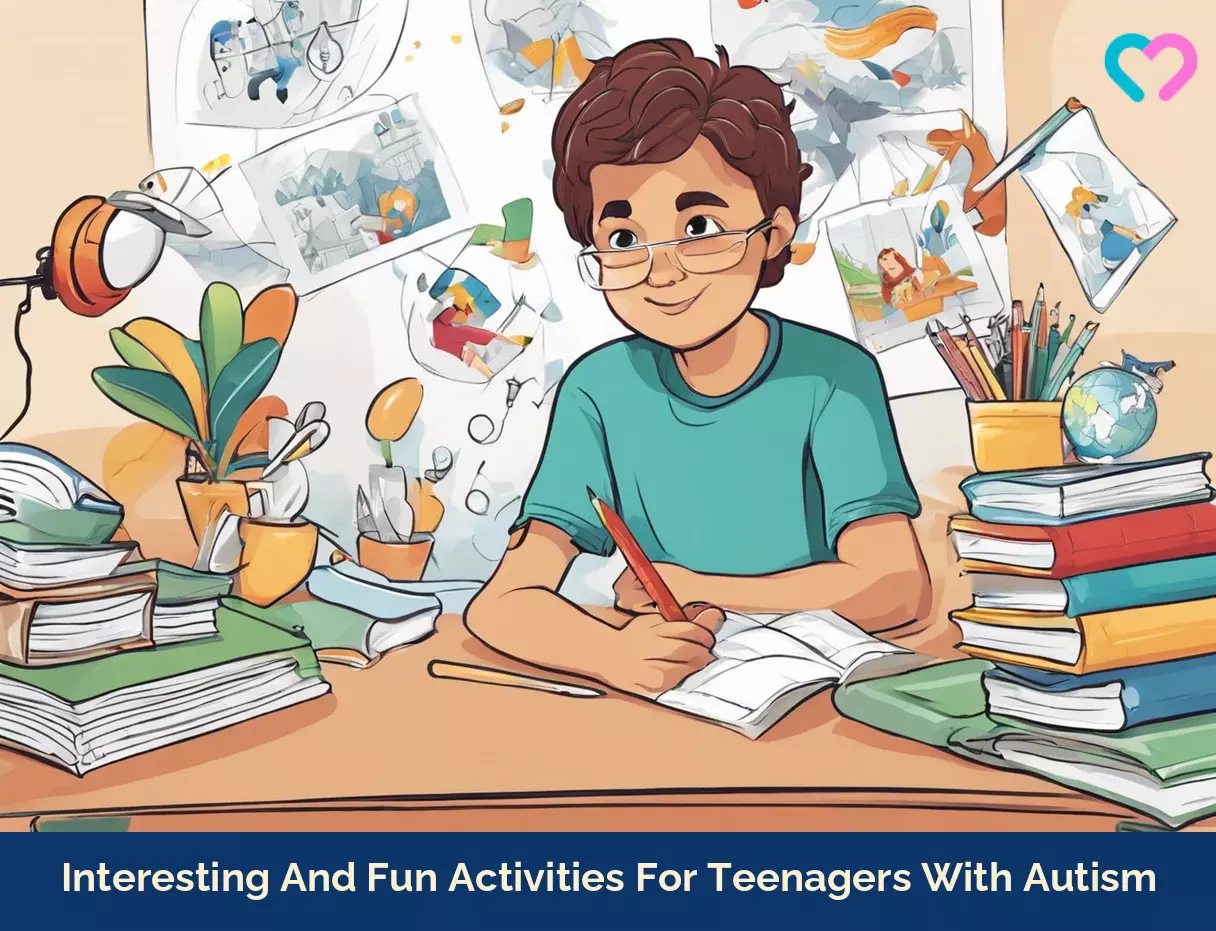
Image: Stable Diffusion/MomJunction Design Team
This fun activity can help children with autism learn to differentiate between colors and engage in some exercise.
Personal Experience: Sources
MomJunction articles include first-hand experiences to provide you with better insights through real-life narratives. Here are the sources of personal accounts referenced in this article.
i. Teaching functional play to students with autism – Part two;
https://adventuresintheatc.blogspot.com/2015/11/teaching-functional-play-to-students.html
ii. Surviving school on the spectrum;
https://www.youngminds.org.uk/young-person/blog/surviving-school-on-the-spectrum/
References
- Autism spectrum disorder (ASD).
https://www.autismspeaks.org/what-autism - Social and recreational activities for autistic pre-teens and teenagers.
https://raisingchildren.net.au/autism/school-play-work/social-life/social-activities-for-teens-with-asd - Six Activities for Teens With Autism.
https://www.integrityinc.org/six-activities-for-teens-with-autism/ - Life skills for autism.
https://www.autismspeaks.org/life-skills-for-autism#:~:text=Many%20people%20on%20the%20autismas%20the%20day%20goes%20on - Is there evidence that playing games promotes social skills training for autistic children and youth?
https://journals.sagepub.com/doi/10.1177/13623613241277309 - Dance/Movement Therapy & Autism.
https://www.adta.org/assets/docs/DMT-with-Autism.pdf - Teens with Autism: Building Independence and Social Skills.
https://transitionsusa.org/teens-with-autism-building-independence-and-social-skills/#:~:text=Being%20outdoors%20often%20reduces%20stress%20and%20anxietybut%20they%20also%20learn%20invaluable%20socialization%20skills - Household Chores for a Child with Autism.
https://www.porchlighteducation.org/modules/summaries/teaching-children-to-help-with-chores-summary.pdf - Bololia Loukia et al.; (2025); Dramatherapy for Children and Adolescents with Autism Spectrum Disorder: A Systematic Integrative Review.
https://www.sciencedirect.com/science/article/abs/pii/S0197455622000399 - Sensory integration therapy.
https://raisingchildren.net.au/autism/therapies-guide/sensory-integration - Ways to Improve Eye Contact and Speech.
https://autismtreatmentcenter.org/knowledge-base/ways-to-improve-eye-contact-and-speech/ - Recognising understanding and managing emotions: autistic children and teenagers.
https://raisingchildren.net.au/autism/development/social-emotional-development/recognising-understanding-emotions-autistic-children-teens#:~:text=Some%20autistic%20children%20and%20teenagersrecognise%20when%20they%27re%20excited - Organising and prioritising – a guide for all audiences.
https://www.autism.org.uk/advice-and-guidance/topics/behaviour/organising-and-prioritising/all-audiences - Sensory sensitivities: autistic children and teenagers.
https://raisingchildren.net.au/autism/behaviour/understanding-behaviour/sensory-sensitivities-asd - Tips for involving your child with ASD in the kitchen.
https://health.choc.org/tips-for-involving-your-child-with-asd-in-the-kitchen/ - An Evaluation of Animal-Assisted Therapy for Autism Spectrum Disorders: Therapist and Parent Perspectives.
https://pmc.ncbi.nlm.nih.gov/articles/PMC8907032/
Community Experiences
Join the conversation and become a part of our nurturing community! Share your stories, experiences, and insights to connect with fellow parents.
Read full bio of Dr. Holly Schiff
Read full bio of Harshita Makvana
Read full bio of Deepa Thomas
Read full bio of Apoorva K






